

Robert Eggers 'Nosferatu' is a symphony of horror


Democracy in action at Metro DC DSA’s 2024 Local Convention
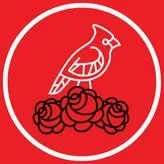

The Second Wave Baby Scoop
The end of World War II marked the beginning of an unspoken era in our history: the baby scoop era. Conservatives, obsessed with an idyllic 1950s America that never really existed, are trying to force us back into a baby scoop era. Overturning Roe v. Wade was just the beginning.
THE Baby Scoop ERA
By Saige S

Norman Rockwell: Freedom from Want
The nuclear family — the idea of a working dad, a stay-at-home mom, and their children — is one of many family structures that has existed in American and world history. Compared to other family structures, particularly multigenerational households, a nuclear family is relatively easy to uproot and move around according to the changing needs of capitalist production, making it the favored family structure of capitalist countries and the bourgeoisie that rule them. In the post-war era, an ideology of hyper-atomized, pure-strain nuclear families came to predominate in the United States. This concept of family, which is still with us today, roots itself in white supremacist patriarchy by centering white, heterosexual nuclear families and othering alternative family structures.
The social attitudes brought on by this rising ideology especially stigmatized “unwed” motherhood, “illegitimate” children, fertility issues, choosing not to have children, and divorce. Single white women were pressured to give up their infants, often by sending them away to maternity homes. These women were looked down on for failing to meet the expectations of white supremacy and patriarchy, and social workers viewed them as “abnormal” and “breeders”. The phrase “Baby Scoop era” was coined to describe the resulting increase in non-relative infant adoptions from the end of World War II until the 1970s.
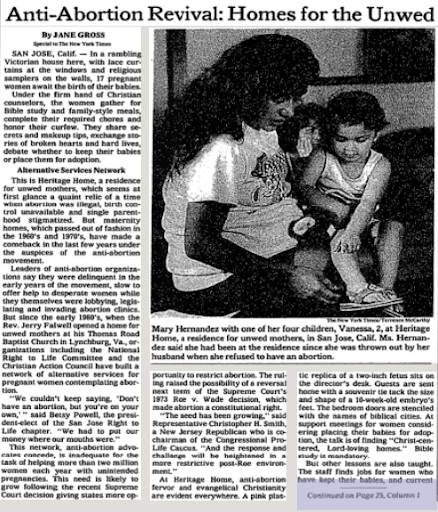
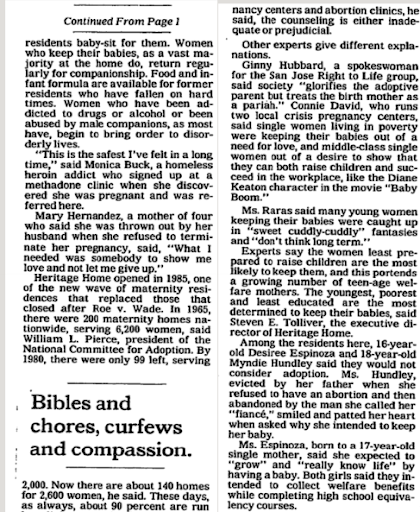


Maternity homes, many of which were religious, were known for strict rules, exploitation, and an isolating environment of shame and grief, and oppressing vulnerable single mothers. Women sought out maternity homes for support or were pressured into entering against their will, but more than 80% of them had surrendered their babies for adoption by the mid-1960s. While many of these homes shut down during the 1970s, Jerry Falwell opened his own “Homes for Unwed Mothers” during the Moral Majority movement.
Rickie Sollinger, author of Wake Up Little Susie: Single Pregnancy and Race Before Roe v. Wade, describes,
“For white girls and women illegitimately pregnant in the pre-Roe era, the main chance for attaining home and marriage… rested on the aspect of their rehabilitation that required relinquishment… More than 80 percent of white unwed mothers in maternity homes came to this decision… acting in effect as breeders for white, adoptive parents, for whom they supplied up to nearly 90 percent of all nonrelative infants by the mid-1960s… Unwed mothers were defined by psychological theory as not-mothers… As long as these females had no control over their reproductive lives, they were subject to the will and the ideology of those who watched over them. And the will, veiled though it often was, called for unwed mothers to acknowledge their shame and guilt, repent, and rededicate themselves.” Sollinger differentiates this era from those before, where “Black single mothers were expected to keep their babies as most unwed mothers, Black and white, had done throughout American history. Unmarried white mothers, for the first time in American history, were expected to put their babies up for adoption.”
Records from the era show that demand for white infants, an appetite for trimming welfare, and a desire to punish unwed mothers inspired adoption agencies to develop an array of devious or coercive methods for separating mothers from their children. One social worker, Georgia Tann, became infamous for kidnapping newborns by telling mothers that the child died shortly after birth and would be (“buried” free of charge). By paying off lawyers, judges, social workers, and nurses she was able to remain undetected for two decades, profiting the whole time from the sale of infants to rich couples. Despite her horrible legacy of child trafficking, she created the closed-adoption model largely still used today.
The Baby Scoop era’s maternity homes inspired the creation of “crisis pregnancy centers” when an anti-abortion activist in Hawaii fought unsuccessfully against the passage of the country’s first law legalizing abortion. The following year, he and his wife opened their home as a maternity home and counseling center for people with “crisis” pregnancies. He later created a string of over 200 anti-abortion centers in more than 60 cities.
The decline of the adoption industry is often attributed to a falling fertility rate. This is linked to various factors, including the introduction of the birth control pill in 1960, the legalization of artificial birth control and abortion, and increased federal funding to family planning services for young and low-income folks. These factors worked together with other social and political reforms of the era like no-fault divorce, the legalization of interracial marriage, and women winning the right to open their own bank accounts. Along with Roe v. Wade, these reforms brought the Baby Scoop era to an end, but the social and political forces that created it were never really dealt with. Although single mothers and “illegitimate” children face less overt stigma, conservatives have been very successful at connecting social problems like poverty and crime to more abortions and more divorces, to fewer adoptions and fewer (white) babies, and, ultimately, to women’s health and women’s independence. If the rollback of a half century of reforms continues on this track, we may well see a second Baby Scoop era.
To fight back, it isn’t enough to highlight the cruelty of Republican policy — we must investigate the social attitudes and power structures around race, gender, and capital that brought us to this point. When conservatives shake their fists over a declining birth rate while the population grows, we must ask whose fertility rate is declining? Which industry is benefiting and which is losing money? Which narratives are being upheld and which are being challenged? Who is benefiting from this system and who is being exploited?
Ushering in the Second Wave Baby Scoop
Conservatives began chipping away at Roe as soon as they got the chance. Slowly but surely, policy by policy, they decimated abortion access by throwing up compounding barriers over a 50 year span. They went after everything from Medicaid to Title X funding, and they implemented mandatory counseling, waiting periods, parental/spousal consent, and TRAP laws designed to force clinics to close. The anti-abortion movement is rooted in the white supremacist “great replacement” theory, which has driven rising anti-immigrant sentiment and a record number of attacks on abortion in the last decade. The escalating rhetoric surrounding the nuclear family and “traditional” gender roles, as well as the rollback of bodily autonomy, is the patriarchy working overtime to undo decades of progress.
This assault culminated in Dobbs v. Jackson Women’s Health, the Supreme Court decision that completed Roe’s death by a thousand cuts. Though nominally their decision was a critique of Roe’s legal basis, the conservative court betrayed their real motives when they argued that safe haven laws are an adequate alternative to abortion and that there was no need to worry about children given up for adoption, because “the domestic supply of infants relinquished at birth or within the first month of life and available to be adopted had become virtually nonexistent” (emphasis mine).
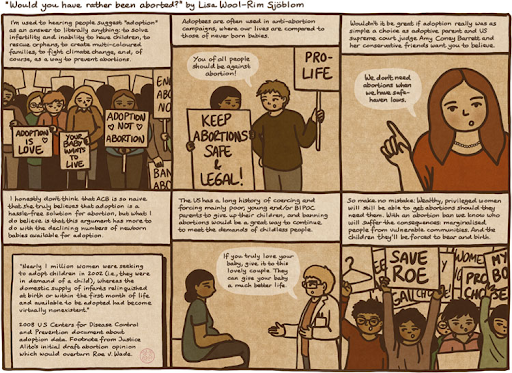
Besides the bone-chilling implication that infants are commodities to be bought and sold, the “domestic supply” language suggests that the religious right’s plan to “fix” this problem is a return to the Baby Scoop era, with natural mothers serving as “breeders” for a revitalized adoption industry. This rhetoric also goes back to chattel slavery (using women’s bodies as vessels and their children as commodities to both materially benefit and and idealistically benefit the capitalist class) which is precisely why the 14th amendment was constructed the way it was, as an effort to put an end to that practice. The machinery needed to exploit this infant windfall is already in place in the form of Christian adoption agencies, crisis pregnancy centers, and maternity homes. Jessica Valenti, who has been closely following the anti-abortion movement post-Dobbs, details the “move in anti-choice states to ‘streamline’ the adoption process and terminate parental rights—and the link that has to the anti-abortion movement and their relationship to evangelical Christian adoption agencies. (In short, it’s a racist clusterfuck.) … Republicans there have advanced legislation to implement baby boxes in the state, which most people don’t know allow the state to terminate parental rights. That means people in their most desperate moment, would be unaware that by using the boxes they may never be able to get their babies back—there have been cases of women spending months to years in court battles trying to reclaim their parental rights.”
Crisis Pregnancy Centers
The anti-abortion movement is well aware that abortion today is much safer than it was before Roe v. Wade1, and have renewed their disinformation crusade post-Dobbs. Anti-abortion centers (also known as “crisis pregnancy centers” or “pregnancy resource centers”) spread misinformation about abortion, pregnancy, and target people who might be seeking an abortion. These centers target pregnant people who might be considering abortion by strategically choosing locations near abortion clinics and utilizing SEO in their online advertising by strategically choosing locations near abortion clinics and specifically targeting searches as simple as ‘pregnancy symptoms’ on Google. While search engine optimization (SEO) is a foundational part of online marketing, this allows AAC websites to be towards the top of search results for queries that call for licensed medical advice.
These centers are often affiliated with a religious organization (primarily Heartbeat International, Care Net, and Birthright). People are lured into the center with promises of free or affordable healthcare, but once inside they are subjected to an anti-abortion sermon, fed misinformation about pregnancy, abortion, and birth control, and directed to religious services like “earn while you learn” programs, private adoption agencies, and maternity homes. Despite being a billion dollar industry, these centers receive generous funding from state and federal programs by posing as healthcare providers.
Maternity Homes
The anti-abortion movement saw the Dobbs decision as the perfect time to open more maternity homes, with the total number of maternity homes increasing nearly 40% during the last two years. There are now over 450 maternity homes across the country. In some states, these homes operate with little regulation from the state. This makes the women who enter them especially vulnerable to financial and emotional abuse through the weaponization of law enforcement and homelessness Unsurprisingly, many maternity homes have affiliations with crisis pregnancy centers and private adoption agencies.
Anti-abortion proponents respond that modern maternity homes provide housing and financial support. But just like during the Baby Scoop era, these homes are “treating women like criminals“. Residents of maternity homes can be forced to attend morning prayer, may have their phones confiscated at night, and may require a pastor’s approval to enter a romantic relationship. They may also be asked to hand over food stamps to pay for communal groceries, or required to install a tracking app on their phone, and homes have called the police on residents who disobeyed the rules. And while they supposedly exist to support mothers, some homes still prioritize adoptions — ultimately, these homes exist to supply infants to a growing market, and provide yet another node where capitalists can mine profit from vulnerability.
Private Adoption Agencies
Both “crisis pregnancy centers” and maternity homes have ties to private, Christian adoption agencies. These agencies are oftentimes religious. There is no federal regulation of the industry, despite federal tax credits for subsidizing private adoptions (as much as $14,300 per child for the adopting parents). These regulations are made at the state level and vary greatly, and govern everything from caps on financial support to how birth parents give consent to an adoption. Many are a part of the broader religious right and will only work with Christians. A Jewish couple in Tennessee were denied adoption by a Christian state-funded foster care placement agency because of their religion in 2021. While LGBTQ couples can’t be denied the opportunity to adopt a child jointly from a public adoption service, private adoption agencies have reputations for refusing to adopt to same-sex couples. It’s been common for adoption agencies to price babies based on their race, although some states and agencies may use other formulas to determine adoption prices (like sliding-scale or uniform prices).
Moving Forward Post-Dobbs
This new Baby Scoop likely won’t look quite the same. Unwed mothers aren’t likely to be sent away for breaking social rules. Instead it will be fueled by the housing crisis, barriers to abortion and birth control, privatized and defunded social services, the weaponization of CPS and termination of parental rights. But much like the first Baby Scoop, it will target those living in poverty, in rural communities, young people, and black, indigenous and communities of color. Anti-abortion centers, adoption agencies, and maternity homes are the forefront of the anti-abortion movement, diverting people toward religious services intent on restricting bodily autonomy. Language is one of the first steps in the escalation of a human rights crisis. The combination of anti-immigrant, pro-nuclear family/anti-LGBTQ, and anti-abortion rhetoric used by the religious right show their need to maintain these systems of oppression to hold onto power. The misinformation campaigns and consequent shifting social attitudes will inevitably be used to justify more restrictive laws, all the way up to full criminalization. Many people will suffer, but a few Christian entrepreneurs will grow rich as white supremacy, patriarchy, and capitalism are further entrenched.
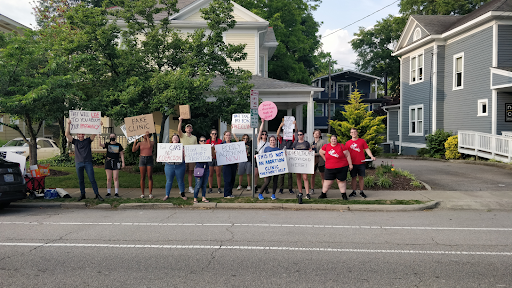
NCTDSA Socialist Feminist Gateway Women’s Care Picket
If we want to see a different future, we have to fight the anti-choice movement on every front. We have to organize and educate our communities, sustain each other through mutual aid, and build collective power at work and where we live, through labor unions, tenant unions, and strategic campaigns like DSA’s own effort to shut down Gateway Women’s Care, an AAC in Raleigh. Above all we have to build solidarity between movements and across the lines of gender, race, and class. It feels vulnerable, hopeless, even naive to call for a solidarity that generations before us failed to build, but the fact remains that the power of regular people can only be realized when they’re together — solidarity is our only weapon, and we need it now as much as we ever have.
There have been a number of medical advancements like safe and effective abortion medication, better ultrasound technology, and more accessible and reliable pregnancy tests. Abortion medication has been shown to be as safe as in-clinic procedures (less than a 2% complication rate) and data shows that 63% of abortions in the United States were performed using abortion pills in 2023. There have been technological advancements in the internet and social media, connecting people to resources and information they may not have otherwise known about. Telehealth makes healthcare more accessible and allows people to get services who may not be able to travel for healthcare due to barriers like cost, navigating insurance, ability to travel long distances, finding childcare, etc. ↩︎


Theories of Washington's Socialists: From Salon to Machine


North Brentwood's Windom Road Barrier Monument


Return to the Contradictions: Making Sense of Abounding Crises


“Fascism and Social Revolution” Reading Group Starts on Thursday!
Join us for a four-part discussion of the R. Palme Dutt text, “Fascism and Social Revolution.” This book was written in 1934 and through the text we intend to learn how capitalism creates crisis, how the crisis creates fascism, how we can analyze fascism, and why socialism is the only peaceful solution to the crisis. This is an extremely relevant text to our present moment and will help us in our own understanding and when talking to others about the current situation.
For the first session, we are reading selections from Chapter 1 and 2. We’ve selected the most essential parts of this book and reduced the page count by half. This is intended to make the reading more accessible for attendees but it is encouraged to read the entire two chapters if you can!
Reading selections:
Chapter 1, Technique and Revolution Section 1 – 4 (pg. 21-45)
Chapter 2, The End of Stabilization Sections 1 – 2 (pg. 46-57)
Refer to the study guide for relevant reading resources and guiding questions and discussion: https://docs.google.com/document/d/17OTih76i93hYdj4qiqDV-qAsuRTqeb0UMcwpBOWpXfs/edit?usp=sharing
Register for the virtual reading group: CLICK HERE


Organizational Underdevelopment, or: A Response to Two Sams


Wilmington DSA Statement on Anti-Trans Legislation
Wilmington Democratic Socialists of America condemns, in the strongest terms, HR 10186, the so-called “Mace Bill,” designed specifically to discriminate against transgender employees of the federal government by restricting bathroom access. WDSA recognizes that this bill is part of a larger trend aimed at breeding hatred against a marginalized group, targeting democratic Congresswoman Sarah McBride, and further dividing the American working class. Some assume the tide of anti-trans sentiment in this country is propelled by personal bigotry. This ignores the backdrop of this prejudiced trend, rising in response to growing class consciousness. As displeasure with American corporatism grows, ideologues who fear class war force culture war issues into the mainstream. HR 10186 stands as a prime example. It attempts to make Americans concerned with their neighbor’s genitals despite the deeply weird connotations. Representative Nancy Mace appears more interested in using slurs against protestors than substantive policy. She seems eager to stir up divisions rather than address the genuine concerns of the working class. Unfortunately, such bizarre bills will become more common and serious as time passes, requiring a unified response. We call on all North Carolina representatives to speak out forcefully against this bill. North Carolina once answered the call to strike down the largely reviled “bathroom bill,” and can do so again. The Democratic Socialists of America stands with our trans community, and we urge all to speak out and do the same. However, it is unlikely that words alone can reverse these attempts to use transgender people as a distraction from the failings of American capitalism.
Anti-transgender bigotry will not be defeated by Republican fearmongering or Democratic class-blind liberalism but by grassroots working-class parties such as the Democratic Socialists of America. We call on all progressive people to join in building this party and forming a more committed front against bigotry and for working-class interests.
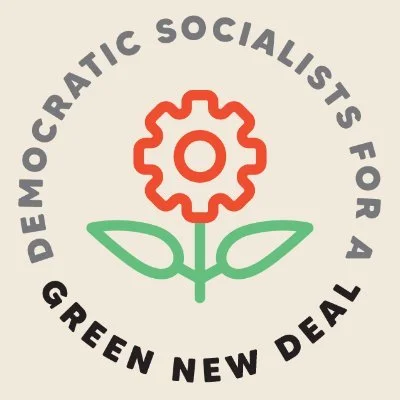

2024 End-of-Year Recap
The incoming Trump administration promises a daily onslaught on the state’s capacity to build the future we’re fighting for, which is why our strategy makes more sense than ever. DSA will be organizing to protect people and fight strategic battles, while not losing sight of the long-term horizon we’re building toward in our communities. We will continue to build power on the local level alongside unions to win public goods for the working class, such as social housing, robust transit, and union-built renewable energy. Read on for our end-of-year recap!
Building for Power campaigns 
Our last huddle of the year focused on our two social housing campaigns: Metro DC’s Green New Deal for Housing and NYC’s House the Future. Comrades from these chapters presented on their campaigns that provide a plan for truly affordable social housing that also prioritizes a move away from fossil fuels by retrofitting existing buildings and ensuring that new buildings are electrified and near transit. Along with providing much-needed housing, these campaigns would also bring good union jobs to each city. The discussion that followed made it obvious that our chapters across the country are all experiencing a housing crisis in their cities and there is a huge need to make robust social housing a reality. View the presentations.
Stay tuned in 2025 when we will be meeting on a quarterly basis to hear updates from all our active B4P campaigns. We currently have 8 campaigns across transit, public power, social housing, and public spaces:
 Louisville Get on the Bus
Louisville Get on the Bus Chicago Fix the CTA
Chicago Fix the CTA Los Angeles Power Mass Transit
Los Angeles Power Mass Transit Milwaukee Power to the People
Milwaukee Power to the People Metro DC We Power DC
Metro DC We Power DC Metro DC Green New Deal for Housing
Metro DC Green New Deal for Housing NYC House the Future
NYC House the Future St. Louis Green New Deal for Public Schools
St. Louis Green New Deal for Public Schools
If you’re thinking about starting a Building for Power Campaign in your chapter, fill out the interest form to let us know!
Brewing in Texas 
A huge shoutout to Austin DSA for hosting a Public Power Town Hall that brought together over 70 attendees passionate about a just renewable energy transition. With participation from key labor and community leaders and elected officials, the discussion highlighted the intersection of climate action and workers’ rights. Dozens of rank-and-file union members attended, sparking conversations about the future of labor and renewable energy in Austin. These are exactly the kinds of coalitions we need to build to win a Green New Deal, and we’re excited to see this campaign take off.
We’re also excited to see the revitalization of Houston DSA’s Ecosocialist Working Group, formally approved by the chapter at this month’s general body meeting. Our comrades have been meeting to research their local terrain and discuss possible campaign demands, and creating excellent educational content along the way.
Stay tuned: all signs point to ecosocialists across Texas building their power in 2025.
What’s next for the Green New Deal 
If you missed the panel at this year’s Socialism conference An Ecosocialism that Builds: What’s Next for the Green New Deal?
It is well worth your time to hear about rebuilding the labor movement with eyes on May Day 2028, with unions like UAW leading the charge. DSA’s post-election mass call Workers Deserve More: Organizing for 2025 is also worth your time. We know multiple crises are converging and the coming years will be difficult, but we will weather the inevitable storms by protecting each other and building power to win the future we deserve.
See you in the new year, comrades, we have a world to win!
The post 2024 End-of-Year Recap appeared first on Building for Power.
